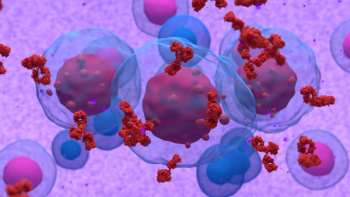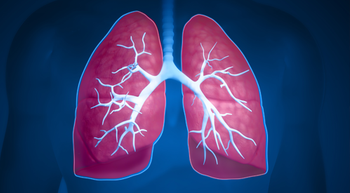
Adagrasib, compared with standard-of-care chemotherapy, significantly improved tumor responses and progression-free survival in patients with KRASG12C-mutated locally advanced or metastatic NSCLC.

Adagrasib, compared with standard-of-care chemotherapy, significantly improved tumor responses and progression-free survival in patients with KRASG12C-mutated locally advanced or metastatic NSCLC.

Talquetamab treatment was safe and efficacious for patients with relapsed or refractory multiple myeloma, including those with comorbidities and poor functional status.

Patients with MammaPrint high-2–risk, BluePrint Luminal B, HR-positive, HER2-negative breast cancer had improved recurrence-free survival when treated with anthracycline/taxane/cyclophosphamide.

Patients with HR-positive, HER2-low, and -ultralow metastatic breast cancer treated with trastuzumab deruxtecan obtained a PFS benefit vs chemotherapy.

Patients with advanced non-small cell lung cancer who received palliative care via telehealth had similar improvements in quality of life as those who received the care through in-person visits.

Perioperative chemotherapy with FLOT improved overall survival in patients with resectable esophageal cancer compared with neoadjuvant chemoradiation with CROSS.

The combination given before lymph node dissection and response-driven adjuvant therapy reduced the risk for recurrence, progression, or death in stage III melanoma.

Adding retroperitoneal lymphadenectomy to cytoreductive surgery did not improve survival in advanced ovarian cancer.

Triplet therapies containing belantamab mafodotin, pomalidomide, and dexamethasone may address an unmet need for relapsed/refractory multiple myeloma.

The survival benefit obtained from consolidation treatment with durvalumab after concurrent chemoradiation may change the standard of care for limited-stage small cell lung cancer.

Compared with placebo, osimertinib after definitive chemoradiotherapy improved progression-free survival in locally advanced, EGFR-mutated non–small cell lung cancer.

Patients with refractory EGFR-mutated, advanced non-small lung cancer had improved responses with low rates of adverse effects with subcutaneous amivantamab vs its intravenous formulation.

Updated data from the MANIFEST-2 study support a paradigm shift in the treatment of JAK inhibitor–naive patients with myelofibrosis.

These data from the COMBI-AD trial represent the longest follow-up to date of adjuvant treatment for stage III melanoma.

Frontline amivantamab plus lazertinib outperformed osimertinib regarding progression-free survival in patients with high-risk EGFR-mutant non-small cell lung cancer.

A brentuximab vedotin-containing regimen led to “unprecedented” progression-free survival improvements in patients with advanced classical Hodgkin lymphoma.

Asciminib led to a superior 48-week major molecular response rate compared with investigator-selected tyrosine kinase inhibitors for Ph-positive chronic phase chronic myeloid leukemia.

Lorlatinib, compared with crizotinib, prolonged PFS and improved time to intracranial progression in ALK-positive non–small cell lung cancer.

HPV vaccines in patients under the age of 40 may have lowered rates of HPV-related cancer compared with unvaccinated patients.

Postmenopausal women who had undergone hysterectomy and received treatment with conjugated equine estrogen alone had an increased incidence of ovarian cancer and mortality rates.

Most survivors of stage I-III breast cancer who attempted pregnancy succeeded, though there were certain factors that seemed to increase the chance of conception.

Using an artificial intelligence-based navigation tool to contact patients who missed their colonoscopy appointment may help them reschedule and potentially attend a new appointment.

Patients with high-risk classical Hodgkin lymphoma who experience a slow early response to frontline chemotherapy may benefit from the addition of pembrolizumab to COPDAC-28 consolidation.

The rate of pathologic complete responses with enfortumab vedotin was 36.4% among patients with muscle-invasive bladder.

A prostate stem cell antigen-directed CAR T-cell therapy agent showed preliminary efficacy in patients with metastatic castration-resistant prostate cancer.

Patients with advanced urothelial carcinoma who received avelumab reported any-grade treatment-related adverse events at a rate of 78.2%.

Jaktinib is a novel JAK and AVCR1 inhibitor that showed activity in patients with myelofibrosis who were intolerant to or progressed on ruxolitinib.

For patients with myelofibrosis receiving pacritinib, spleen volume reduction was associated with improved overall survival.

Patients with breast and gastrointestinal cancers reported fewer hand-foot syndrome events following treatment with topical diclofenac gel.

The phase 1/2 TRANSCEND CLL 004 trial met its primary end point by demonstrating that lisocabtagene maraleucel elicited responses in patients with relapsed/refractory chronic lymphocytic leukemia/small lymphocytic lymphoma.